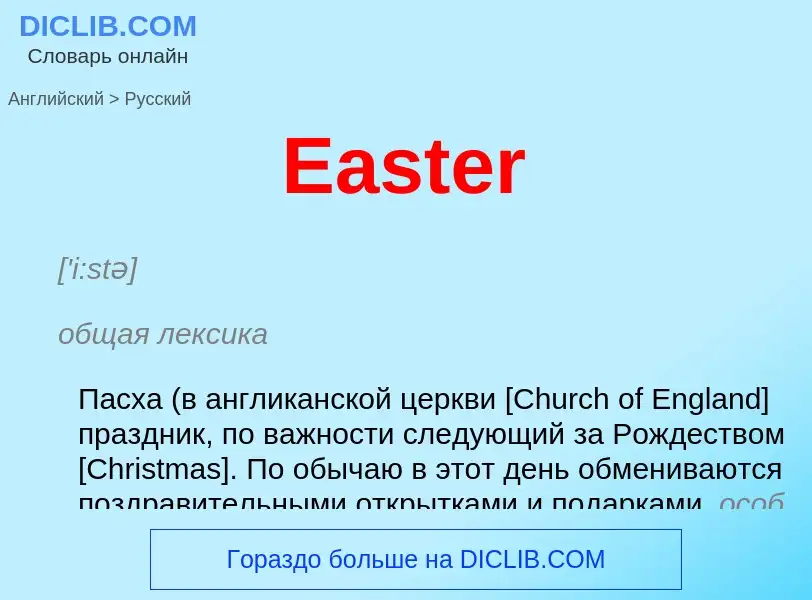Traducción y análisis de palabras por inteligencia artificial ChatGPT
En esta página puede obtener un análisis detallado de una palabra o frase, producido utilizando la mejor tecnología de inteligencia artificial hasta la fecha:
- cómo se usa la palabra
- frecuencia de uso
- se utiliza con más frecuencia en el habla oral o escrita
- opciones de traducción
- ejemplos de uso (varias frases con traducción)
- etimología
Easter - traducción al Inglés
['i:stə]
общая лексика
Пасха (в англиканской церкви [Church of England] праздник, по важности следующий за Рождеством [Christmas]. По обычаю в этот день обмениваются поздравительными открытками и подарками, особ. шоколадными яйцами)
синоним
существительное
церковное выражение
пасха
пасхальный
Definición
Wikipedia
.jpg?width=120)
Easter, also called Pascha (Aramaic, Greek, Latin) or Resurrection Sunday, is a Christian festival and cultural holiday commemorating the resurrection of Jesus from the dead, described in the New Testament as having occurred on the third day of his burial following his crucifixion by the Romans at Calvary c. 30 AD. It is the culmination of the Passion of Jesus Christ, preceded by Lent (or Great Lent), a 40-day period of fasting, prayer, and penance.
Easter-observing Christians commonly refer to the week before Easter as Holy Week, which in Western Christianity begins on Palm Sunday (marking the entrance of Jesus in Jerusalem), includes Spy Wednesday (on which the betrayal of Jesus is mourned), and contains the days of the Easter Triduum including Maundy Thursday, commemorating the Maundy and Last Supper, as well as Good Friday, commemorating the crucifixion and death of Jesus. In Eastern Christianity, the same days and events are commemorated with the names of days all starting with "Holy" or "Holy and Great"; and Easter itself might be called "Great and Holy Pascha", "Easter Sunday", "Pascha" or "Sunday of Pascha". In Western Christianity, Eastertide, or the Easter Season, begins on Easter Sunday and lasts seven weeks, ending with the coming of the 50th day, Pentecost Sunday. In Eastern Christianity, the Paschal season ends with Pentecost as well, but the leave-taking of the Great Feast of Pascha is on the 39th day, the day before the Feast of the Ascension.
Easter and its related holidays are moveable feasts, not falling on a fixed date; its date is computed based on a lunisolar calendar (solar year plus Moon phase) similar to the Hebrew calendar. The First Council of Nicaea (325) established only two rules, namely independence from the Hebrew calendar and worldwide uniformity. No details for the computation were specified; these were worked out in practice, a process that took centuries and generated a number of controversies. It has come to be the first Sunday after the ecclesiastical full moon that occurs on or soonest after 21 March. Even if calculated on the basis of the Gregorian calendar, the date of that full moon sometimes differs from that of the astronomical first full moon after the March equinox.
The English term is derived from the Saxon spring festival Ēostre; Easter is linked to the Jewish Passover by its name (Hebrew: פֶּסַח pesach, Aramaic: פָּסחָא pascha are the basis of the term Pascha), by its origin (according to the synoptic Gospels, both the crucifixion and the resurrection took place during the week of Passover) and by much of its symbolism, as well as by its position in the calendar. In most European languages, both the Christian Easter and the Jewish Passover are called by the same name; and in the older English versions of the Bible, as well, the term Easter was used to translate Passover.
Easter traditions vary across the Christian world, and include sunrise services or late-night vigils, exclamations and exchanges of Paschal greetings, flowering the cross, the wearing of Easter bonnets by women, clipping the church, and the decoration and the communal breaking of Easter eggs (a symbol of the empty tomb). The Easter lily, a symbol of the resurrection in Western Christianity, traditionally decorates the chancel area of churches on this day and for the rest of Eastertide. Additional customs that have become associated with Easter and are observed by both Christians and some non-Christians include Easter parades, communal dancing (Eastern Europe), the Easter Bunny and egg hunting. There are also traditional Easter foods that vary by region and culture.

.jpg?width=200)


![The [[Last Supper]] celebrated by Jesus and his disciples. The early Christians, too, would have celebrated this meal to commemorate Jesus's death and subsequent resurrection. The [[Last Supper]] celebrated by Jesus and his disciples. The early Christians, too, would have celebrated this meal to commemorate Jesus's death and subsequent resurrection.](https://commons.wikimedia.org/wiki/Special:FilePath/Last-supper-from-Kremikovtsi.jpg?width=200)
![paskha]] in the background. paskha]] in the background.](https://commons.wikimedia.org/wiki/Special:FilePath/Paskhakustodiev.jpg?width=200)

![St. George Greek Orthodox Church]], Adelaide). St. George Greek Orthodox Church]], Adelaide).](https://commons.wikimedia.org/wiki/Special:FilePath/Receiving the Holy Light at Easter.jpg?width=200)

![A priest blessing baskets with Easter eggs and other foods forbidden during [[Great Lent]] A priest blessing baskets with Easter eggs and other foods forbidden during [[Great Lent]]](https://commons.wikimedia.org/wiki/Special:FilePath/2004 Velikden Pascha Gorazd Andrej Timkovic Presov monastyr.jpg?width=200)
.jpg?width=200)
![Easter eggs, a symbol of the [[empty tomb]], are a popular cultural symbol of Easter. Easter eggs, a symbol of the [[empty tomb]], are a popular cultural symbol of Easter.](https://commons.wikimedia.org/wiki/Special:FilePath/Easter eggs - straw decoration.jpg?width=200)
![An Easter egg decorated with the [[Easter Bunny]] An Easter egg decorated with the [[Easter Bunny]]](https://commons.wikimedia.org/wiki/Special:FilePath/Easter-egg-3195.jpg?width=200)
